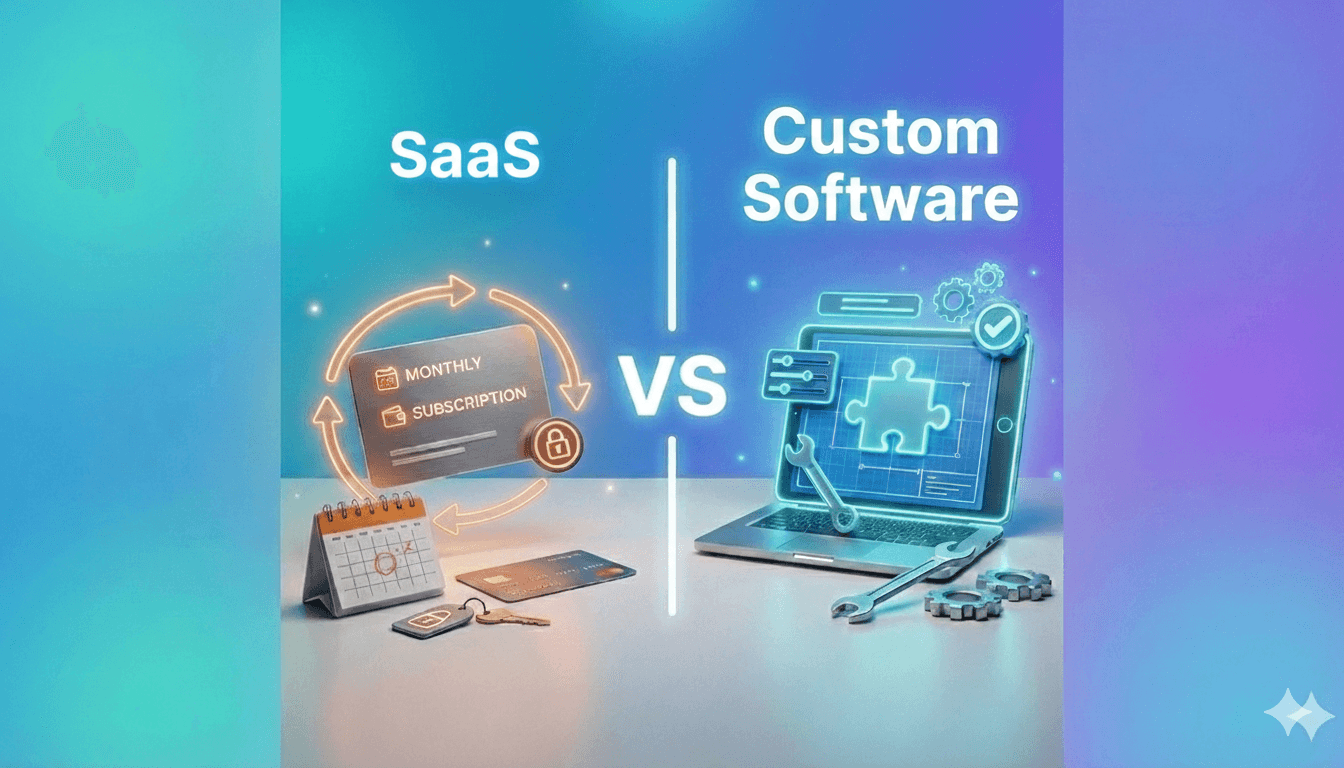In today's world, where digitization dictates the pace of business, custom software is becoming increasingly essential. It is no longer just an option — it's a key component of any company's strategy to outperform the competition. While "off-the-shelf" solutions might initially seem cheaper and quicker to implement, they often fail to meet the specific business requirements of an organization. On the other hand, custom software, tailored specifically to a company's needs, can significantly enhance its efficiency and competitive edge. This article explores why these factors are so crucial in building a strong market position.

What is Custom Software?
Custom software refers to IT solutions created specifically for a given organization to precisely meet its unique needs and requirements. This software is designed from scratch or assembled from ready-made components, always considering the company's specific goals and business processes.
Custom Software vs. Off-the-Shelf Solutions
To better understand the value of custom software, it's worth comparing it to off-the-shelf software, which is created for a broad audience and sold as a final product. Here are the main differences:
License and Ownership
With custom software, the client owns the final product, meaning they have full rights to use, modify, or resell it without additional restrictions. This is a significant difference compared to off-the-shelf software, which is delivered under licensing terms — where the user acquires a license to use the product under specific conditions but does not have the right to sell, modify, or distribute it. Full control over software ownership gives the client the ability to personalize and decide on the direction of its development. For example, they can commission the addition of new features, improve security, or integrate it with other systems without needing permission from the original software provider.
Initial and Long-Term Costs
While custom software can come with higher initial costs, it often proves more economical in the long run. Tailoring it to a company's specific needs eliminates the necessity of paying for unnecessary features that may be irrelevant to the organization but often present in off-the-shelf solutions. Additionally, the absence of licensing fees is a significant factor in reducing long-term system maintenance costs.
On the other hand, ready-made products, despite lower initial costs, can generate additional expenses in the future. As mentioned earlier, companies often incur subscription fees for functionalities they don't use, as well as for regular updates and license extensions. These products may also require costly customizations to better meet the specific needs of the enterprise, significantly increasing their overall cost over the software's lifecycle.
Flexibility
Custom software can be more easily adapted to changing business needs. Off-the-shelf systems often have rigid operational frameworks. When a company grows or changes direction, such software may no longer suffice. As a result, the organization must seek new solutions, incurring additional costs and disruptions in operations.
Support and Maintenance
Custom software offers technical support tailored to the specific needs of the company and how it uses the software. This means that when a problem arises, specialists know the system exactly and can quickly resolve it. In the case of off-the-shelf software, technical support is more general, as it must serve various companies with different needs. Therefore, support may be less effective in addressing the unique problems of a specific company.
In summary, the choice between custom and off-the-shelf software depends on many factors, including the company's business specifics, technological needs, budget, and development plans. For companies seeking deep integration and maximizing daily work efficiency, custom software often proves to be the best choice.
How Custom Software Creates a Competitive Advantage

Software designed specifically for a company's needs can significantly contribute to its competitiveness in several key ways. Here are some areas where such solutions have a significant impact:
Innovation
Companies using custom software can create unique functionalities and services that are difficult for competitors to copy. This not only facilitates market differentiation but also attracts customers seeking innovative solutions tailored to their specific needs.
For example, an e-commerce company can develop its own software for product recommendation personalization based on machine learning algorithms. This system, by analyzing purchase history and online behavior of users, provides personalized product offers. This personalization not only increases customer loyalty and conversion rates but also gives the company a clear competitive advantage over standard market solutions that are not as well-suited to individual customer needs.
Data control and use
Companies that decide to develop their own software solutions gain full control over their data. This allows them to use this information to create additional value without the risk of valuable information falling into the hands of competitors. Such control enables safe innovation and more efficient use of data to achieve market advantage.
For example, a company in the energy sector using off-the-shelf software for wind power production forecasting might unintentionally share performance data with software providers, leading to information leaks to competitors. In contrast, companies investing in custom software can design systems so that data serves only them — to improve operations, predict market changes, and create their own unique action plans. In business, often the one with more precise predictions wins the competition.
Optimization of Business Processes
By tailoring software to the company's internal processes, customized solutions allow for the streamlining of operations, reducing the time needed to complete tasks, and increasing overall work efficiency. These improvements can include everything from automating routine tasks to integrated data management systems that support strategic decision-making.
Off-the-shelf solutions, while often offering similar features, do not always fit perfectly with a company's specifics. They may require adjusting the company's processes to the software rather than the other way around. Some features may be unnecessary or insufficient, limiting the potential benefits of automation and data integration.
Increasing Customer Satisfaction
Custom applications tailored to user needs can significantly improve their experience with the product. Personalization of user interfaces (appearance and way of interacting with the application), functionalities tailored to specific customer requirements, as well as faster and more effective support are just some of the possibilities such software can offer.
For example, a company offering online fitness services decided to create its own training application. If the company were to use a popular, widely available training application, its offer would look very similar to other similar services, making it difficult to stand out from the competition. Thanks to custom software, the company can offer unique features, such as personalized training plans, integration with health monitoring devices, interactive live sessions with trainers, and personalized dietary recommendations based on user progress analysis. These brand-specific elements not only improve user experience but also help the company build a stronger, distinctive presence in the online fitness services market.
Security and Compliance
Security and compliance are crucial in regulated industries such as finance or energy. Although universal, off-the-shelf products can be cost-effective and quick to implement, they often do not meet the specialized security requirements and regulations that are critical in a given sector.
For example, banks typically avoid using off-the-shelf products. Existing market software often cannot meet the high security standards necessary to protect sensitive financial data. Instead, banks prefer to invest in their own solutions that allow for precise customization of security features and ensuring full compliance with current personal data protection regulations. This individual approach minimizes the risk of security breaches, which could lead to severe consequences such as customer identity theft, unauthorized transactions, and even international financial scandals. By using their own solutions, banks not only better protect themselves from cyberattacks but also gain the flexibility to adapt to constantly changing legal requirements, increasing their competitiveness and strengthening their reputation in the eyes of customers.
Benefits of Custom Software

Personalization and Fit to Business Needs
Oprogramowanie na zamówienie umożliwia dostosowanie zakresu funkcjonalności i interfejsów do specyficznych wymagań firmy, co ma kluczowe znaczenie dla poprawy jej wydajności. Dzięki temu przedsiębiorstwa mogą usprawnić swoje procesy, redukując zbędne kroki i automatyzując zadania, które wcześniej wymagały ręcznej interwencji. Przykładowo, firma logistyczna może zintegrować planowania trasy z analizą danych w czasie rzeczywistym, aby optymalizować dostawy, zmniejszać koszty paliwa czy czas pracownika. Personalizacja nie tylko zwiększa efektywność, ale również poprawia ogólną satysfakcję pracowników dzięki łatwiejszej i bardziej intuicyjnej obsłudze systemów.
Integration with Existing Systems
Jedną z największych zalet oprogramowanie na zamówienie jest jego zdolność do łatwej integracji z już istniejącymi systemami technologicznymi w organizacji. Dzięki temu firmy mogą lepiej wykorzystać swoje obecne inwestycje w technologię, nie tracąc czasu i zasobów na wymianę całych systemów. Na przykład: system CRM stworzony pod daną firmę może być zaprojektowane tak, aby współpracować z istniejącym oprogramowaniem księgowym. Dzięki temu, gdy użytkownik wprowadza dane finansowe w systemie księgowym, te same informacje automatycznie pojawią się w systemie CRM. Oznacza to, że pracownik nie musi ręcznie wpisywać tych samych danych w dwóch miejscach, co ułatwia pracę i sprawia, że wszystko działa sprawniej.
Flexibility
Custom software is designed to grow with the company and adapt to changing market conditions. This means that companies can easily add new features or modify existing ones as their business develops or market requirements change. For example, a medical device manufacturer, in response to new regulations regarding patient data security, may need to implement additional security and compliance features in its data management software. Custom software enables quick and effective integration of such features without the need for a complete system change or investment in new, costly solutions. Thanks to this flexibility, the company can not only meet current legal requirements but also react flexibly to future changes in regulations, which is crucial for maintaining operational continuity and protecting reputation.
These three key benefits — personalization, integration, and scalability — make custom software an attractive option for companies seeking to optimize their operations and increase their competitive advantage in the market.
Challenges and Solutions

Costs and Risks Associated with Custom Software
Investing in custom software comes with certain challenges, including significant initial costs and risks associated with choosing the right vendor who understands the specific needs of the company and can deliver effective solutions. These costs are not limited to the development stage but also include long-term support, maintenance, and possible system modifications. Ensuring that the final product fully meets business expectations and requirements is crucial for achieving the intended improvements in the company's operations and financial benefits.
To better understand the entire process of creating custom software and the necessary steps to achieve optimal results, we invite you to read our article "What the individual software development process looks like?" This article details each stage of designing and implementing custom
How to Minimize Potential Obstacles
To minimize the risks and costs associated with custom software, it is crucial to precisely define project requirements and choose an experienced technology partner. It is advisable to select vendors with experience working with companies of a similar profile or industry. Companies should also pay attention to the vendor's flexibility in adapting the product to changing needs and market conditions.
We invite you to explore our offer on the DevsPower website, where you will find detailed descriptions of our services, work methods, and examples of projects we have successfully implemented. Additionally, in the article "What is the cost of dedicated software?" we present an analysis of the costs associated with different types of software projects, which can help better understand and plan the budget for custom software needs.
By approaching project planning and collaborating with an experienced vendor consciously, companies can not only reduce costs but also maximize return on investment (ROI) from custom software, ensuring a competitive advantage in the market.
The Future of Custom Software

Custom software is evolving, opening new paths for innovation and transforming the way companies approach their operations. In this dynamically changing reality, new technologies such as artificial intelligence (AI) and machine learning (ML) play a key role in shaping custom IT solutions.
The Role of AI and ML in Custom Software
Integrating artificial intelligence and machine learning into custom software brings revolutionary changes, allowing companies not only to automate processes but also to gain a significant competitive advantage through deeper analyses and better use of available data. By owning custom software and having full control over the collected data, companies can use ML models to discover significant patterns and trends that are inaccessible to competitors.
Example of Using AI and ML to Build Competitive Advantage
Suppose an e-commerce company uses custom software that integrates AI to analyze customer behavior on its platform. The company collects data on how users browse pages, which products they add to their carts, and their final purchase decisions. Using this data, the ML model is trained to identify patterns and user preferences, allowing for the creation of personalized product recommendations.
Thanks to these personalized recommendations, the company can not only increase sales by better matching the offer to customer expectations but also optimize inventory management and promotional strategies. Moreover, the ability to predict purchasing trends and quickly respond to changing customer preferences becomes a key asset that allows the company to stay ahead of the competition, which may not have such deep insights into market needs.
Such use of AI and ML in custom software not only increases operational efficiency but also introduces a new dimension to customer interactions, leading to greater loyalty and customer satisfaction. As a result, the company not only improves its financial results but also strengthens its market position as a leader in innovation and service personalization.
Summary

In summary, custom software offers dynamic opportunities for businesses that want not only to survive but also to grow and succeed in today's rapidly changing business environment. With the ability to tailor to specific needs, integrate with existing systems, and adapt to new market conditions, custom software becomes a key element of a strategy that can significantly increase a company's competitiveness.
We encourage you to delve further into the topic and consider how custom software can impact your business. For those ready to take this step, we invite you to explore our offer on the DevsPower website, where you will find detailed information about our services and collaboration opportunities. Don't miss the chance to elevate your business to a new level with technologies tailored to your unique needs!



